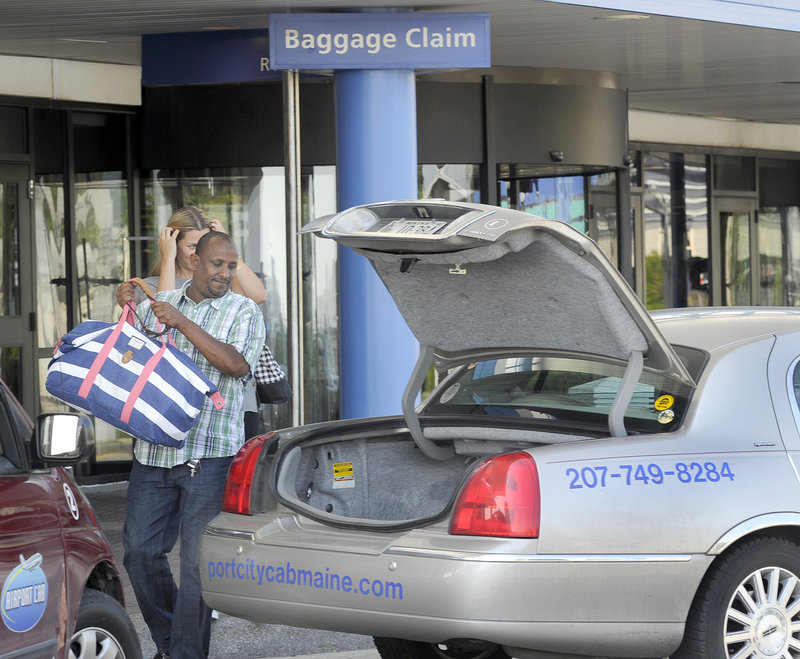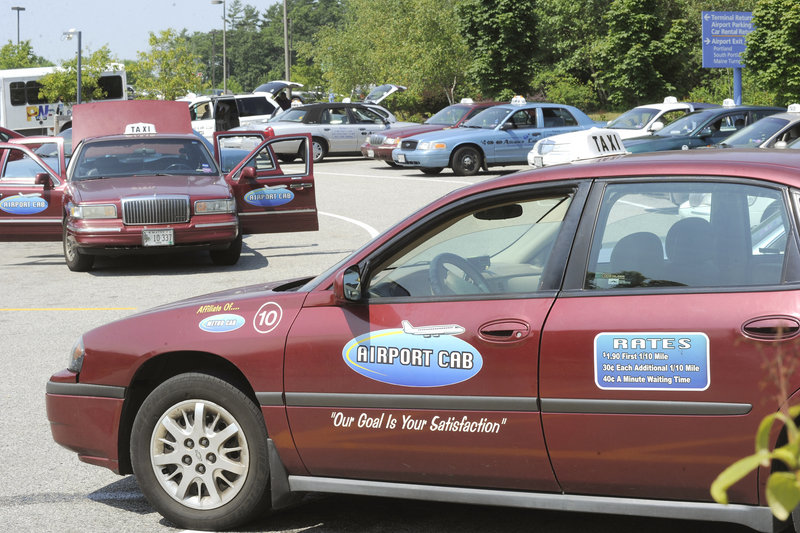PORTLAND — The city is headed for another showdown with a group of taxi drivers who hold special permits to pick up passengers at the Portland International Jetport.
At issue is Portland’s policy governing taxi drivers who are allowed to wait for passengers outside the airport terminal, which had 1.7 million passengers last year.
Any driver who is called can drop off and pick up passengers at the airport. But to wait outside the baggage claim area, cab drivers need special permits.
The city changed the policy last year, but quickly restored its previous policy in response to a lawsuit filed by the jetport taxi drivers, who received nearly 43,000 fares last year at the airport.
The number of Jetport Access Permits, which cost $800 a year, is capped at 40 to minimize congestion at the airport.
When the cap was imposed about two years ago, there were 50 permit holders. Rather than pulling 10 permits, the city allowed the drivers to renew their permits, with the hope that the total number would fall through attrition.
That hasn’t happened, because many permit holders allow others to apply for and use their access permits through power-of-attorney laws. Forty-nine access permits are still active.
Last year, the city tried to remove the power-of-attorney option, since it never intended for the permits to be transferable, by requiring drivers to appear in person for their permits.
But 11 cab drivers, most of them immigrants, sued the city. They argued that the new rule would cause hardship and force them out of business, because they often must leave the country to see their families and may not be able to get their permits in person. The city withdrew the changes.
Now, the city is proposing five ways to reduce the number of permits, and give all taxi drivers a chance at getting them.
There are 304 licensed drivers, 170 licensed cabs and 109 licensed cab companies in Portland.
The changes being considered include issuing access permits through a lottery; allotting spaces on a pro-rated basis to cab companies and independent drivers; using an open token or medallion system; and letting drivers sell their permits at market-driven or city-set costs.
The City Council’s Transportation, Sustainability and Energy Committee will review the proposals Wednesday.
Airport officials are leaning toward a lottery system as the fairest way to award Jetport Access Permits, said Paul Bradbury, the airport’s director, who sets the taxi policy.
“There’s pros and cons to each of these (options),” he said. “We’re going to try to work our way through it and listen some more.”
Allotting spaces in the 27-vehicle taxi parking lot on a pro-rated basis could effectively force out independent cab drivers, said Bradbury, who also opposes allowing drivers to sell their permits — essentially codifying what is happening now.
A token system, in which drivers pay a fee for every fare they pick up, may work, he said, if there is a way to give drivers real-time information about demand and prevent cabs from cycling through the airport.
Councilors have not been willing to pursue a medallion system capping the number of taxis citywide, he said.
Current holders of jetport permits plan to oppose any changes to the current rules, which award the 49 permits to the same drivers, said Sigmund Schutz, an attorney in the Portland-based Preti Flaherty law firm who filed the lawsuit against the city in December.
“These are first-generation U.S. immigrants trying to make a living to support their families,” Schutz said. “For the city to be repeatedly creating chaos and fear they’re not going to be able to continue what they’re doing, and where they have very few opportunities to make a living, is wrong.”
Schutz said the immigrant taxi drivers believe that opening the permitting process to all cab drivers would force them out of business, because the independent drivers don’t have the infrastructure — such as offices and dispatchers — to compete with large cab companies.
Schutz opposes the proposed lottery system, saying such systems aren’t used to regulate other overcrowded professions. But Bradbury said something must be done to bring down the number of permits and give all drivers a chance to receive them.
Airports of similar size typically choose one cab company to provide service through competitive bidding, Bradbury said. Companies pay the airport a percentage of their revenue, as airport food vendors and car rental companies do, he said.
“Currently, we don’t make money on taxis,” Bradbury said.
Managing cabs at the airport costs about $100,000 a year, Bradbury said. The city has an automated vehicle identification system, similar to the E-ZPass on the Maine Turnpike, to track cabs at the airport.
Only two cabs are allowed to wait outside the baggage claim area, while others wait in a parking lot beyond the parking garage. When a cab at the terminal leaves, other drivers are notified on a first-in, first-out basis.
In addition to the tracking system, the airport must have workers to maintain order and enforce the rules, Bradbury said. A competitive bidding process is not being considered this time, since councilors previously expressed no interest in one.
Councilor David Marshall, who chairs the Transportation, Sustainability and Energy Committee, said that option was discarded because it would have pushed out the immigrant cabbies.
“(The contract) usually goes to a national taxi company,” Marshall said. “They’re usually the most organized around this (bidding process).”
A change in the jetport taxi policy doesn’t need the council’s approval, but Bradbury said he would like any changes to be informed by and endorsed by the council’s transportation committee.
Bradbury said he plans to incorporate the committee’s and community’s feedback into his final recommendation, to be presented to the committee next month. Any policy changes would take effect in January.
Staff Writer Randy Billings can be contacted at 791-6346 or at:
rbillings@mainetoday.com
Twitter: @randybillings
Send questions/comments to the editors.





Comments are no longer available on this story